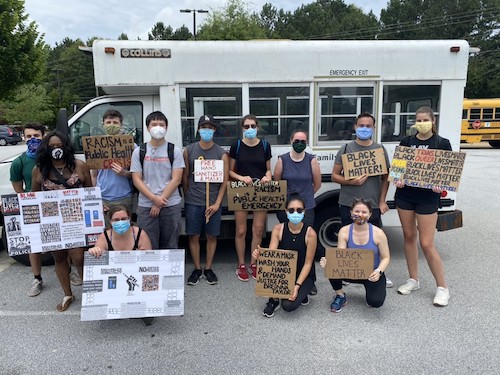Emory EPI Responds: Student Group Distributing PPE at Black Lives Matter Protests
Category : #WeAreEmoryEPI
As the COVID-19 pandemic continues to surge throughout the United States with the number of reported cases and case fatalities rising at alarming rates,1 a concurrent public health crisis has reentered the national discourse. Thousands of people have taken to the streets across the US in recent months to protest the murders of George Floyd, Breonna Taylor, and many other Black Americans and raise their voices to demand action against systemic racism.
At the forefront of this national conversation is the rampant police brutality faced by Black Americans.2 As stated by the American Public Health Association, “racism is an ongoing public health crisis,” that demands the attention and commitment of public health professionals across all disciplines.3 Amongst public health circles, the intersection of prevalent racism and the ongoing COVID pandemic has also shed a new light on existing racial health inequities,4 which have been exacerbated by the disproportionate effect of COVID on Black communities.5
Protests and rallies began earlier during the pandemic not long after the CDC updated their guidance to recommend masks be worn by everyone in public. During this time a greater degree of uncertainty around the seriousness of COVID in the US remained amongst the general public, and thus compliance with mask recommendations varied widely,6 and continues to vary widely, throughout the US.7 Understanding the potential need for additional supplies of personal protective equipment (PPE) and seeing an opportunity to use their privilege as Emory students to support the Black Lives Matter (BLM) Movement, a group of Emory EPI students came together with the goal of helping make protests and rallies in Atlanta safer for those in attendance.
Rising second year EPI students Lisa Chung and Zoe Schneider spearheaded this effort to gather Rollins students in support of the BLM movement. After reaching out to friends and colleagues in the department to help make this idea a reality, they came together and created a proposal explaining the need for PPE and asking for financial support from the school, which they then submitted to RSPH Dean Dr. James Curran. Department Vice Chair Dr. Jodie Guest, Dr. Allison Chamberlain, Shannon Vassell, and Joanne Williams were also instrumental in helping their group draft a budget and prepare their proposal. The proposal was approved by the Rollins administration within 24 hours, and by the next day Dr. Guest had ordered and received 8,000 surgical masks, hand sanitizer, and gloves for them to begin distributing. After securing the supplies, they put out calls for volunteers to assist in the PPE distribution amongst EPI students and other departments at Rollins.
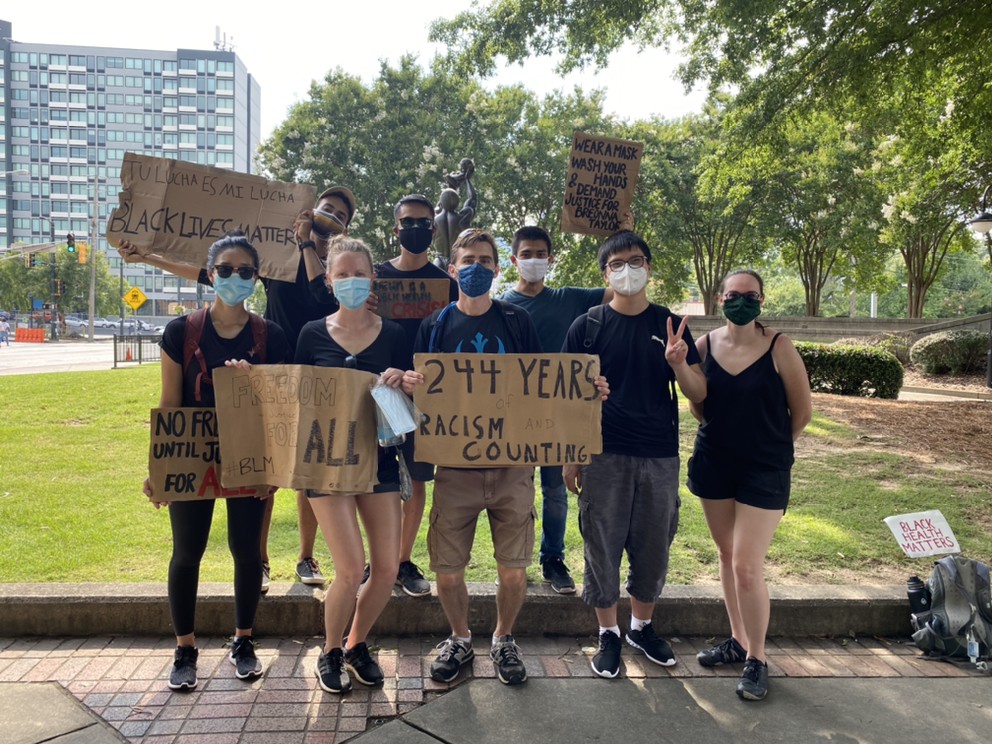
This week we spoke with three of the student leaders, Zoe Schneider, Brandon Shih and Izzy Kates, that have been involved in the efforts to support BLM protests and rallies through PPE distribution.
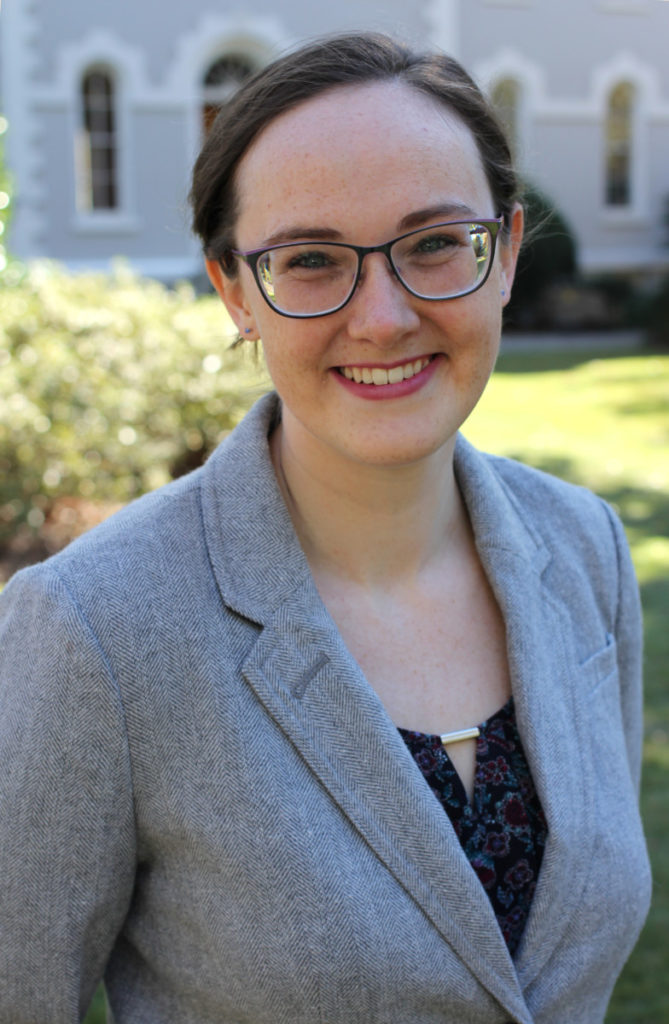
Zoe Schneider 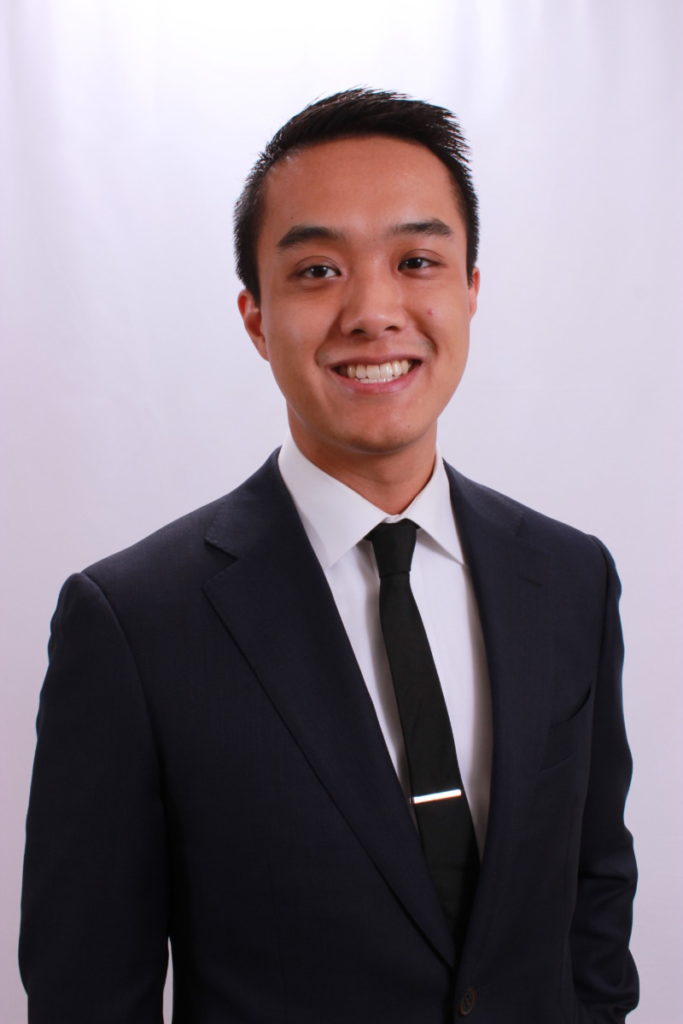
Brandon Shih 
Izzy Kates
Brandon is a 2nd year MSPH student who earned his Bachelor’s degree in Psychobiology from UCLA in 2014. After college Brandon worked as a Data Analyst at Amphastar Pharmaceuticals, and then as a Clinical Research Data Coordinator at UC San Francisco GI Oncology before starting at Rollins.
Izzy studied behavioral and community health and minored in international development at the University of Maryland. After graduating in 2018 he worked at a drug abuse research organization for a year before beginning his MPH.
Zoe, Brandon and Izzy described how, at many of the protests they attended within the Atlanta perimeter, they found mask adherence to be relatively high. Witnessing such a high proportion of protestors wearing masks was a great success in their view as they felt the best case scenario at each new event was that their efforts would be largely unneeded. They also expressed that the need for PPE distribution has gone down over time as public awareness of the importance of wearing masks, especially in public and amongst crowds, has increased.
Prior to each protest they would reach out to the event’s organizers to collaborate on a plan and discuss possible locations where they could distribute PPE. At each demonstration each of their members would approach people to offer masks and hand sanitizer, then try to educate them about how to properly wear masks, how to fit masks to younger children, and general tips for protecting themselves against COVID while protesting. While they encountered some individuals who were not receptive to their efforts, they stated that the vast majority of people they encountered were supportive and appreciative of their work to ensure that sufficient PPE was available.
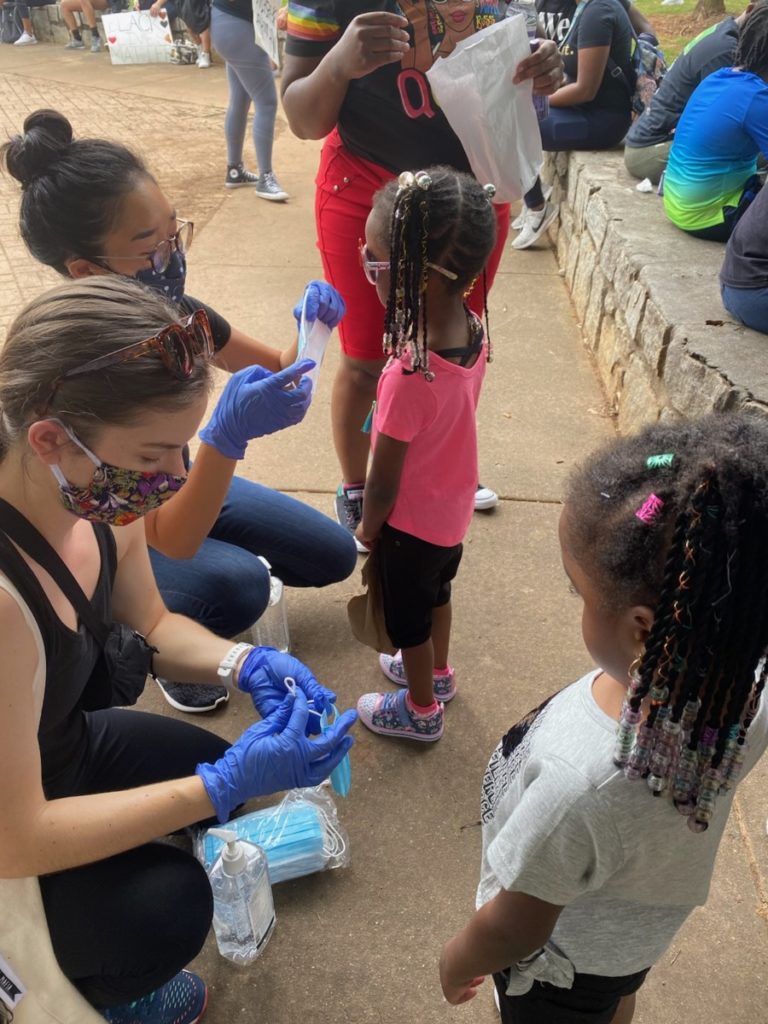
Q: What have been your biggest takeaways, as both a student and a future public health professional, from participating in the protests?
Zoe: Especially during this pandemic, it is very easy to feel overwhelmed by the amount of work that needs to be done. Escaping from my computer screen and working with a team of fellow students reminds me that every little thing we can do to make the world a better place is important.
Brandon: As a student and future public health professional, the biggest takeaway from this effort has been seeing how important community engagement is. Before every protest, we reached out to the protest organizers to let them know our plan. We asked them if there was a preference of where they wanted us to make their event go smoothly. Most of the time, we were intermingling with the protesters but it was important for us to communicate and show that we were open to their suggestions. We are stronger when we stand united and work together.
Izzy: The best part of every protest for me [was] the marching. Trying to lend our collective voice in support of the protests. Definitely my biggest takeaway from participating in the protests was the importance of centering black voices. And hope. The number of people who showed out was truly inspiring and uplifting. I do believe that there is definitely potential right now for us to re-think some policy decisions that have been made, that disproportionately impact communities of color.
Q: How do you think we as Rollins and Emory EPI students can continue to take action to show support for the Black Lives Matter movement?
Zoe: Be prepared to support the Black Lives Matter movement in the long run. There is no single action that can fix the legacy of slavery and racism in our country. As public health professionals, it is our obligation to continue to educate ourselves and fight against inequity and racism in our research and interventions.
Brandon: Unfortunately, we have started to see fewer BLM protests coordinated throughout Atlanta and it has been hard to find protests to show up to recently. However, that does not mean we should give up – this is a movement, not a moment. Personally, I have been trying to unlearn my own biases and start reading books that address institutional racism such as The Racial Contract and How To Be An Antiracist. I want to challenge each and every Rollins student, not just EPI students, to engage in similar activities. Regarding what Rollins can do to show support for the BLM movement: we stand behind The Association of Black Public Health Students, Students for Social Justice, and Rollins Student Government Association and their demands one hundred percent. The letter sent to the Dean and other RSPH administration staff back on June 4th details 14 actionable items that Rollins can do now.
*Editorial Update* Dean Curran responded to the letter in a school-wide email with commitments to address many of the needs surrounding these demands in early July and the Dean’s Office continues to work with the above-mentioned student organizations to implement those changes.
Izzy: Of course, we can continue attending protests, posting on social media, calling our representatives. But I think it’s even more important to focus on what is happening internally at Emory – whether we’ve succeeded in providing a welcoming space for our fellow students and faculty from communities of color and whether we are advocating for them to our administration. Showing up is so important. I know I haven’t always managed to do that to the extent of my abilities.
Thank you for reading this week’s edition of Emory EPI responds, and thank you to all of these amazing students who have been working to empower others to get involved in the BLM movement and make protesting safer for those advocating for racial justice in Atlanta. Please stay tuned for the next article in this series as we continue to highlight the ways in which Emory EPI students are contributing to public health work on the ground and supporting communities throughout COVID-19.
1 https://www.nytimes.com/interactive/2020/us/coronavirus-us-cases.html. Published July 20, 2020. Accessed July 23, 2020.
2 Edwards F, Lee H, Esposito M. Risk of being killed by police use of force in the United States by age, race–ethnicity, and sex. Proc Natl Acad Sci. 2019;116(34):16793-16798. doi:10.1073/pnas.1821204116
3 Dr. Georges Benjamin. Racism is an ongoing public health crisis that needs our attention now. American Public Health Association. Accessed July 23, 2020. https://www.apha.org/news-and-media/news-releases/apha-news-releases/2020/racism-is-a-public-health-crisis
4 Bassett MT, Graves JD. Uprooting Institutionalized Racism as Public Health Practice. Am J Public Health. 2018;108(4):457-458. doi:10.2105/AJPH.2018.304314
5 Millett GA, Jones AT, Benkeser D, et al. Assessing differential impacts of COVID-19 on black communities. Ann Epidemiol. 2020;47:37-44. doi:10.1016/j.annepidem.2020.05.003
6 CDC Now Recommends Americans Consider Wearing Cloth Face Coverings In Public. NPR.org. Accessed July 23, 2020. https://www.npr.org/sections/coronavirus-live-updates/2020/04/03/826219824/president-trump-says-cdc-now-recommends-americans-wear-cloth-masks-in-public
7 Katz J, Sanger-Katz M, Quealy K. A Detailed Map of Who Is Wearing a Mask in the U.S. The New York Times. https://www.nytimes.com/interactive/2020/07/17/upshot/coronavirus-face-mask-map.html. Published July 17, 2020. Accessed July 23, 2020.
Image Sources: Zoe Schneider, Brandon Shih, Izzy Kates
